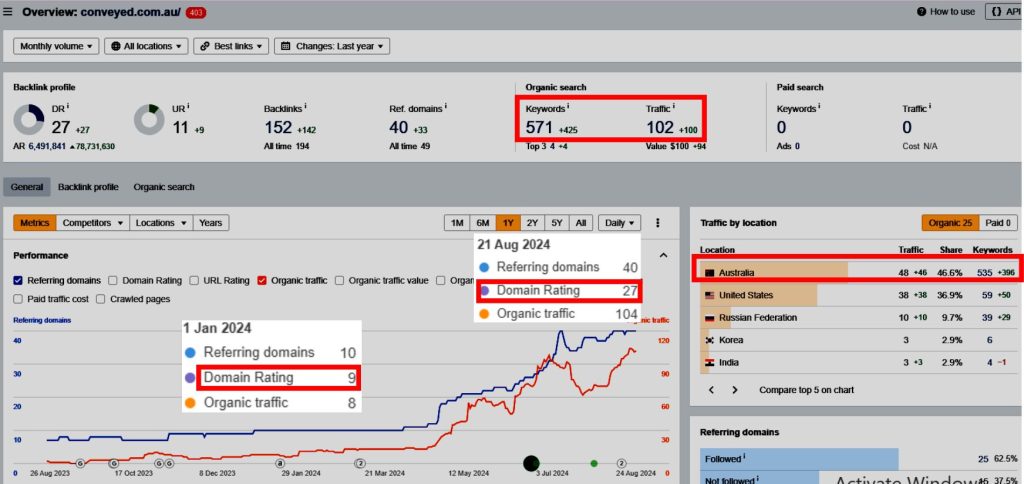Successful SEO for Conveyancing Website from Australia – DR from 9 to 27
Learn 100% successful SEO strategy for small business in Australia. In several months, the traffic tripled, and the ranking rose for the most relevant keywords. Based on the case study of SEO for a conveyancing firm, we’ll show you the steps taken, from keyword research and competitor analysis to creating a robust content strategy and initiating effective link-building practices.
Discover the insights and strategies that will propel your conveyancing website’s visibility and success, including the use of technical SEO and local SEO.
Successful SEO for Conveyancing Website from Australia

Why is SEO important for Conveyancing Websites?
Advanced SEO strategies will successfully improve website ranking, drive organic traffic, and foster authority building, making it easier for potential clients to find conveyancing firms when they need them most.

Leveraging SEO is an option- it’s a necessity for effective client engagement. It plays a vital role in digital marketing and:
- Attracting organic traffic
- Effective use of local SEO (with improved Google Business Profile)
- Impact on client acquisition
- Building online authority
- Boosting brand awareness
Incorporating a multifaceted approach guarantees sustained growth and a competitive edge that every conveyancer should aim for.
Keyword Research and Competitor Analysis
Keyword research and competitor analysis are foundational components of an effective SEO strategy, as they allow businesses to identify competitive keywords and gaps in the market that will greatly increase their online presence. A successful conveyancing firm such as Conveyed, which we worked on, should develop targeted strategies to capture more organic traffic, improve website ranking, and optimize site architecture.
Keyword Gap Analysis
Keyword gap analysis is an SEO technique that identifies keywords for which competitors rank but your website does not. As such, it uncovers opportunities for improving online visibility and content strategy.
To effectively perform KW gap analysis, use Ahrefs.
- Start by listing the main competitors in your niche.
- Using the selected tool, extract the keywords they are targeting.
- Compare this data against your own website’s keyword portfolio to pinpoint the gaps.
The strategic approach improves content optimization and facilitates marketers’ refining of SEO efforts, resulting in improved rankings and increased organic traffic over time. Using keyword optimization through gap analysis will influence content direction and market competitiveness.
Importance of Competitor Analysis?
Competitor analysis is vital in developing a successful SEO strategy. It provides insights into competitors’ strengths and weaknesses, allowing businesses to refine their content strategies.

For successful competitor analysis, you should choose from a variety of tools such as SEMrush, Ahrefs, and Google Analytics. We recommend Ahrefs, despite the fact that it’s the most expensive. It will aid you:
- Examine keyword performance and identify high-ranking targets,
- Review backlink profiles to increase linking strategies,
- Find keyword gaps compared to chosen competitors,
- Find keywords other conveyancing websites rank for,
- Provide metrics that will show which marketing strategy each conveyancing firm is implementing,
- Analyze content strategies to pinpoint effective topics and formats.
❗When you see what conveyancing competitors are doing right, you may adopt and adapt an SEO strategy to bolster ranking and topical authority in the market.
Creating a Topical Map and Content Strategy
Creating a topical map and content strategy supports the structured organization of content that aligns with user intent and search engine algorithms. Outline key topics related to the property industry and integrate relevant blog articles into a content calendar to increase topical authority and show expertise (Google wants us to do so).
What is a Topical Map?
A topical map is a visual representation of content topics and subtopics that assists businesses in organizing content strategy in a way that improves SEO and boosts website ranking. A topical map facilitates targeted keyword optimization and provides content that aligns with the interests of the target audience, ultimately leading to better organic traffic.
The structure of a topical map clarifies the hierarchy of topics and promotes a deeper understanding of content relevance. When businesses employ this approach, they will:
- Identify content gaps that may be leveraged for future articles
- Establish a coherent narrative that guides readers through interconnected subjects
- Boost the overall site authority and topical relevance
A systematic approach facilitates a more organized content ecosystem, effectively catering to audience needs and search engine algorithms.
How was the Content Strategy Developed?
The content strategy was developed through a meticulous process involving keyword optimization, audience analysis, and alignment with SEO best practices. Each piece of high-quality content effectively addresses user needs. A content calendar was created to streamline the publishing schedule for consistent engagement and continuous improvement in SERP ranking.

The initial phase of developing this strategy was comprehensive, involving thorough research to identify target audience demographics and preferences.
Once keywords are established, align them with the content themes and topics the audience finds appealing. A detailed content calendar serves as a roadmap for content creation and scheduling.
- Focus on creating high-quality content that fulfills user queries.
- Regularly update and refine the content strategy based on performance metrics.
- Encourage feedback to better understand audience needs and preferences.
- Incorporate trending topics and industry insights to keep content relevant.
Initiating Link-Building
Initiating link-building is a fundamental aspect of any SEO strategy, as it allows for the establishment of authority and drives organic traffic to a website. Focusing on white-hat link-building techniques and creating high-quality backlinks that improve site credibility and boost overall search engine ranking, ultimately increasing visibility within the competitive property industry.
Backlinks are the gold of the Internet. Without them, your website’s DR (domain rating) will remain low. With a low domain rating, you will not rank high for the most relevant keywords. ❗This means you need backlinks to reach the top in searches – plain and simple.

The owner of Conveyed, Melissa Barlas, realized this and took an active part in acquiring backlinks. As a prolific podcaster, she started guest podcasting. Also, she initiated a campaign to bring guests for partnering firms to her podcast. Each podcast episode thus provided one extremely valuable backlink from websites most relevant to the niche.
❗What was more valuable is that backlinks acquired in this way came from websites that do not link to millions of other websites but only to selected ones. Those backlinks are most valuable by Google and provide the best confirmation of the brand and local business.
Link-Building: Major Ranking Factor in SEO?
Link-building is considered a major ranking factor in SEO, as search engines like Google evaluate the quantity and quality of authority backlinks to determine a website’s authority and relevance.
When a website earns high-quality backlinks from reputable sources, it signals to search engines that the site is trustworthy and valuable to users.
For instance, a blog post with numerous backlinks from authority sites can climb to the top of search results, making it more likely for users to engage with the content. In contrast, a site lacking backlinks may struggle to rank competitively.
❗Therefore, it is important to employ effective link-building methods—including guest blogging, partnerships, content marketing, and leveraging platforms like Facebook and YouTube—to improve overall SEO effectiveness.
- Quality backlinks increase site DR.
- Improved visibility leads to organic traffic growth.
- Effective strategies include guest blogging, partnerships, and local SEO.
DR (Domain Rating) Growth due to Link-building and SEO Strategy
Domain Rating (DR) growth is a direct result of effective link-building strategies, where the accumulation of high-quality backlinks improves a website’s credibility and search engine authority. The growth leads to increased organic traffic.
Measuring DR involves analyzing a site’s backlink profile, which is a complex interplay of factors such as the quality and quantity of links from reputable sources. This analysis often requires technical SEO expertise. The more authoritative sites that link back, the higher the DR score rises.
The metric serves as a vital indicator of a site’s potential to rank well on search engines and attract more visitors.
- As the DR improves, so does the likelihood of organic traffic growth.
- The correlation emphasizes the need for businesses to invest in robust link-building practices.
Maintaining a consistent focus on acquiring valuable backlinks ultimately translates into a more sustainable online presence.
Optimizing Existing Content
Optimizing existing content is a vital practice within SEO. With it, businesses grow the relevance and effectiveness of all web pages, thereby improving website ranking and driving organic traffic. Basic on-page SEO is a must and the first step. You must:
- Refine high-quality content,
- Update outdated information,
- Incorporate targeted keywords.
We often see that the website isn’t SEO – which is a huge problem for ranking. For some unknown reason, many designers do not implement basic SEO practices while building websites. Google crawlers can’t properly understand unoptimized web pages, leading to low ranking.
The second step is adding unique content in the form of case studies, guides, manuals, examples – anything valuable to potential clients. Give to get – that is what Google wants from us.
Melissa Barlas agreed with the suggested SEO improvements. Unlike many ego-driven owners, Melissa recognized the importance of proper on-page SEO, and she took an active role in upgrading existing content.
Success SEO Strategy Impact Website Traffic?
The success of an SEO strategy is often measured by its impact on website traffic, with effective techniques leading to substantial traffic growth and increased online visibility. Implement a described approach, including keyword optimization, link-building, technical SEO, and content strategy, and you’ll see a huge jump in organic traffic and overall website ranking.
Key Takeaways from this Case Study

The key takeaways from the case study showing the advanced SEO implemented on the conveyancing website highlight the importance of a well-structured strategy that contains thorough keyword research, effective content strategy, smart link-building, brand-boosting, and a focus on local market dynamics. The case study revealed that:
- Conducting detailed keyword analysis makes sure that the content is optimized for both user intent and search algorithms.
- Regularly updating and optimizing existing content led to augmented user engagement and retention.
- Incorporating local SEO practices helped the website connect better with its target audience, driving more qualified traffic.
- Constant link-building raised the DR from 9, when the cooperation started, to 27.
- The final result is over 100 monthly visits with high conversion rates.
Conveyed terminated Google Ads campaign that was draining all their profit and continued investing in organic ranking and all SEO tactics needed for further traffic boost.
Successful SEO for Conveyancing Website from Australia – DR from 9 to 27 Read More »












































